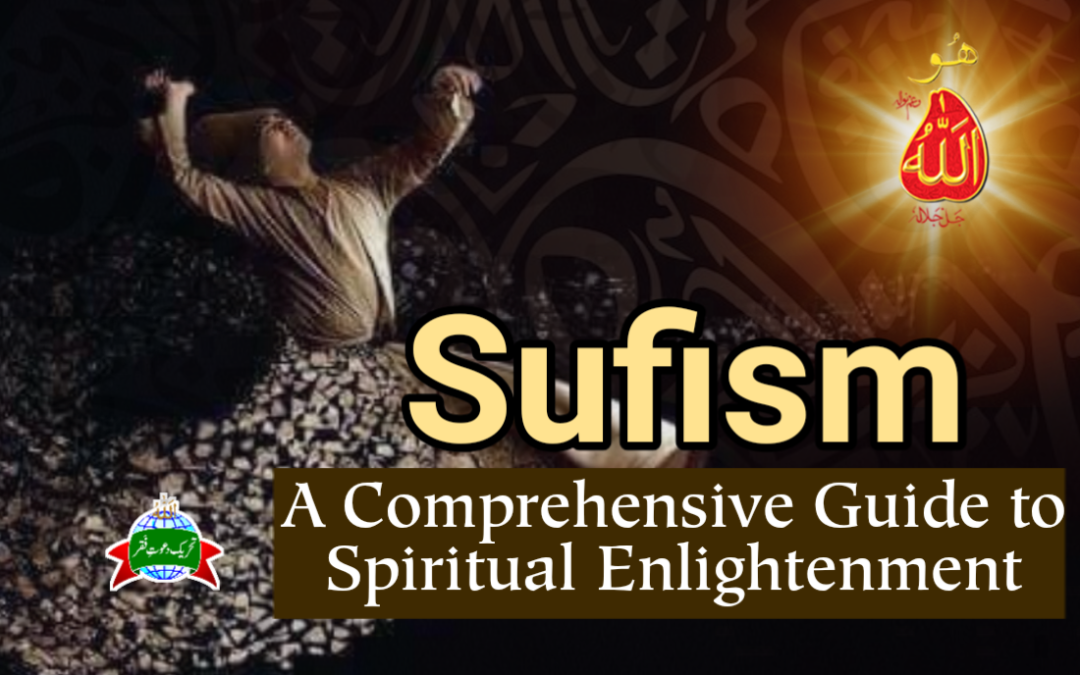Sufism:
A Comprehensive Guide to Spiritual Enlightenment
Sufism (Faqr) is the knowledge of those inner states through which the purification of the self, refinement of morals, and the development of both the inner and outer aspects take place so that a person can attain eternal bliss.
Sufism is a science that enlightens the soul and brings creation closer to their Lord. The seeker of this path, through inward enlightenment, can witness Allah and converse with Him. Sufism is the essence of Islam; it is the beauty, perfection, and completeness of Islam, encompassing both outward and inward virtues. The relationship of Sufism to sharia is like the soul to the body.
In Islam, the concept of sharia and tariqa is that a person, through physical purity and meditation learns that the human soul is in essence the entry of the transcendental worlds into a human being. Because the soul is from the light of Allah, meaning it is a part of the whole. When one witnesses its reality, they observe Divine Essence within.
Sufism is the name of a way of life in which a person turns away from everything other than Allah and establishes a selfless connection with their Beloved. Through this bond of servitude, they attain the spiritual pleasures, expansiveness, and delight, which Allama Iqbal described as follows:
دو عالم سے کرتی ہے بیگانہ دل کو
عجب چیز ہے لذتِ آشنائی
Explanation: When one attains gnosis of Divine Essence, it makes the person indifferent to everything.
Sufism In light of the teachings Sufi Saints:
Shaikh Maruf al-Karkhi famously said that Sufism is about comprehending the realities and becoming independent of whatever is in the hands of the creation.
Junaid Baghdadi says:
To forsake everything besides Allah and become self-annihilated is Sufism. (Sar Dilbaran)
Abu Bakr Shibli: Living a delightful life in Divine presence is called Sufism.
These quotes from various Sufi scholars provide further insight into the nature and purpose of Sufism:
Shaikh Zakariya Ansari: Sufism is the knowledge through which the method of purifying the self, refining morals, and constructing both the outward and inward aspects is determined, with the aim of attaining eternal happiness. (Al-Risalatah al-Qushayriyah)
Allama Ibn Asakir: Sufism, in my view, is the state of inner detachment (from everything besides Allah). (Tareekh Madinat al-Dimashq, Vol. 41, p. 215)
Abu Ali Qazwini: Sufism is adopting highest ethics. (Ilm-e-Tasawwuf)
Ali ibn Pandar al-Sairani: Sufism is when the seeker does not see him or herself, both outwardly and inwardly, but sees the Divine Essence. (Kashf al-Mahjub)
Sultan Bahoo defines Sufism in the following way:
Sufism is characterized by four letters: ‘T’, ‘S’, ‘W’, and ‘F’. The ‘T’ stands for the seeker’s self and wealth being spent in the way of Allah and offering its reward to the blessed soul of the Prophet Mohammad (pbuh). The ‘S’ signifies staying on the straight path. The ‘W’ means not breaking promises, and the ‘F’ leads to the opening of the inward and annihilation of the self. A seeker who does not possess these qualities cannot be called a Sufi. (Mohkim-ul-Fuqara Kalaan)
Sultan Bahoo further says:
What is the meaning of Sufism? Sufism is the complete purification of the inward, gnosis of Divine Essence, and immersion in Divine Oneness. The tongue of a perfect Fakir is the sword of Allah. (
Mohkim-ul-Fuqara Kalaan)
Periods of Sufism
Historians have divided the history of Sufism into three periods, considering its origin, rise, and decline.
First Period
The first era of Sufism is the era of the Holy Prophet, the Companions and the Tabiun (people who benefited from the Companions). In this era, Sufism was present in its fullness and perfection, but it was not referred to as Sufism. “instead, it was expressed using terms like asceticism, piety, and benevolence. In this era, among the Companions and the Tabiuns like Imam Zayn al-Abidin, Imam Hasan of Basra, Owais al-Qarani, Said ibn al-Musayyib, Ta’us Yamani, Dawood bin Dinar, Muhammad Bin Suleman Al Tamimi, Aamir bin Abdullah Tamimi, and Muhammad bin Makki are worth mentioning.
Second Phase
In the era of Tabiun, Sufism entered its second phase. During the second and third centuries after the Hijra, as the decline of sincerity in practice began and the focus shifted more towards jurisprudence, the People of Truth turned towards self-purification and embarked on a journey of spiritual struggle (mujahada) and asceticism to establish a strong connection with Allah. Through spiritual struggle, they experienced various inner states, such as solitude, ecstasy, selflessness, unveiling, and Divine inspirations, which they described in their writings.
During this phase, notable individuals include Rabia of Basra, Habib al-Ajami, Malik Dinar, Al-Fudayl ibn ‘Iyad, Abd Allah ibn-al-Mubarak, Ibrahim ibn Adham, Bishr al-Hafi, Muhammad al-Shaybani, Dhul-Nun al-Misri, Harith al-Hassabi, Bayazid Bastami, Sari al-Saqati, Junayd of Baghdad, and Sahl al-Tustari, among others.
Third Phase
This period spans over the fourth and fifth centuries after Hijra. In this phase, while the general population adhered to established religious practices and outward observance, the spiritual elite, went beyond mere actions and states. The selected few among them progressed to higher spiritual stages and it was due to their exceptional devotion that they discovered the path of intimate focus (tawajjuh).
The inner veils lifted and they were blessed with Divine vision. They then became absorbed in Divine Essence. In this era, notable figures include Abu Sa’id al-Kharraz, Abu al-Hasan Kharaqani, Abu Ali al-Rudbari, Mohammad Yousuf Abu al-Farah Tartusi, Abu Bakr al-Shibli, Abu al-Qasim al-Qushayri, Abu Uthman al-Maghribi and Al-Ghazali. Ghaus al-Azam Shaikh Abdul Qadir Jilani also lived in the later stages of this period. (Haqiqat-e-Tasawwuf)
Present Age
In today’s age, some fake guides have made Sufism a means of worldly gain. Sufism is seen as a way of generating income in the name of spiritual guidance. The Khanqahs that once brought about revolutions in the lives of millions have now turned into places where gatherings, processions, and ecstatic dances have taken centre stage. This contemporary version of Sufism is perhaps the worst phase and we are witnessing this with our own eyes.
This version of Sufism is far from the authentic and sincere spiritual path that it traditionally represents. Its essential for those who are genuinely interested in Sufism to seek out genuine and knowledgeable spiritual guides who can guide them on this path of inner purification.
The reality is that the spiritual system of Islam, Sufism, can elevate a person to the level of spiritual observations, absolute certainty, and the highest level of faith. It can cleanse the self (inner or spiritual being of a person) from undesirable attributes and materialistic tendencies.
Divergent Views on Sufism within Islam
Regrettably, within the framework of these pure and profound spiritual teachings, Muslims have created two extremes. The first group refuses to accept Sufism and considers it a foreign concept. These individuals attempt to discredit the invaluable contributions of Sufi Saints, and they often interpret the diverse schools of thought within Sufism as contrary to Islam.
On the other hand, the second group consists of ignorant, unprincipled, and pseudo-Sufis who have tainted Sufism. These individuals, often lacking in both knowledge and practice, have commercialised Sufism in various forms, using it as a means to accumulate wealth and fame. They have spread their influence far and wide, and their approach to Sufism often involves distorted and superficial practices, rather than genuine spiritual purification and inward enlightenment.
In this context, there are numerous individuals who fit Allama Iqbal’s verse, “The Khanqahs are now occupied by ascetics and grave diggers” Sufism, in essence aims to facilitate self-purification and spiritual enlightenment to attain Divine gnosis, which is, in fact, the ultimate purpose of human creation, as emphasised by the Holy Quran.
Allah says in Quran:
وَ مَا خَلَقْتُ الْجِنَّ وَ الْاِنْسَ اِلَّا لِیَعْبُدُوْنِ
Meaning: And I created the jinn and human beings solely to adopt My servitude.
Reforming Sufism in Contemporary Context
Sufis believe that the only way of attaining gnosis of Divine Essence is self-realisation. Hence, in Sufism the focus is on self-recognition which leads to gnosis of Divine Essence.
However, in the present era, many superstitions are being propagated in the name of Sufism, and many corruptions have entered it. The way Sufism is being presented is extremely detrimental to Islam and Muslims.
In the current age, Sufism is being introduced with ignorance, irreligiosity, in violation of the sharia (Islamic law), and with the connotation of dance and music, which is entirely contrary to Islam. Therefore, it is imperative that along with the revival of Sufism, there should also be a reform in the concepts of Sufism. The original essence of Sufism, which is in accordance with the teachings of the Quran and sunna, should be presented to the people so that any misconceptions regarding Sufism can be removed, and the true essence of Sufism can be understood.
Sufism is not something separate from Islam; rather, the foundation of Sufism is the Quran and Hadith. True Sufism is living life in accordance with Islam. It is a form of faith and belief, it is the purification of the inward and enlightenment of the soul while adhering to the principles of sharia. Sufism is the combination of the Divine commandments related to an individual’s external actions and the moral teachings connected to the purity of one’s inner self.
The beautiful harmony of sharia and tariqah (spiritual path) is what defines Sufism. Those who follow this path and convey the true message of Islam to people, guiding them on the right path, are known as Sufis.
Role of Sufism in Deepening Faith and Insight
Within Islam, there is a structured system that brings forth specific results in terms of beliefs and faith. This system is based on spiritual experiences and observations, which is what Sufism is all about. Essentially, following the path of Sufism results in the acquisition of the strength to experience spiritual insights, and these experiences lead to the profoundness of faith.
When an individual reaches this stage, the states and conditions that people often consider impossible become possible for them. What is considered unattainable suddenly becomes within reach. Matters that were once deemed complicated and difficult become easy. For those who have never set foot on the path of Sufism and have not yet grasped the reality of spiritual experiences, attaining the depth of faith, like the people of Sufism, remains unattainable.
This is the reason why the profoundness of knowledge and practice among the Sufis cannot be present in the general populace because their knowledge, rooted in the depths of love, leads them to surpass all others and enables them to reach the Beloved (Allah Almighty).
In short, there is an even greater need and significance for Sufism today to imbue faith with certainty and to benefit from the reality of faith. Those who adopt Faqr (Sufism), enlighten their inwards and develop the insight to delve deep into every newly arising issue. They observe it to its core with their inner strength and insight, and the paths of truth and falsehood begin to appear distinctly before them.
Stages of Progression of Sufism
First Stage
- Purgation of the self
- Sanctification of the Soul
- Obedience to the Divine Essence
Second Stage
- Divine love
- Contentment on Divine Will
- Divine knowledge
Purgation of the Self
Purgation of the self which is the first step on the path of Faqr (Sufism), is the process of cleansing the self from all impurities and undesirable attributes. Sufism requires that the human self be freed from falsehood and dishonesty, that vices like hypocrisy and pretence are eradicated, that arrogance, pride, and conceit are uprooted, that envy and malice are eliminated, that the love of the world and greed are removed from the human inward, and in place of these vices, feelings of submission, humility and modesty, beneficence and generosity, Divine love, shine in the inward, and the self of a person rejects all kinds of vices and feels alienated from them. When the inward becomes pure, its perspective changes.
Sanctification of the Soul
After purgation of the self, the second fundamental objective of Sufism is the sanctification of the inward (soul). When the self is cleansed from sins, impurities, and vices, the effects of this purity begin to manifest on a person’s inward. When a person’s anger is overcome by emotions of mercy, forgiveness, and forbearance, their personality takes on a more graceful aspect, and the effects of this transformation become noticeable in practical life.
It is as if one of the aims of Sufism is to bring the inward back to its true nature. If the inward remains tainted, it is wicked, but if it becomes pure, it becomes virtuous. Then, the guidance from the Quran has an impact on this purified inward, which is receptive.
In the same way that no knowledgeable person would pour fresh and sweet milk into a dirty, foul-smelling, and unclean container, how is it possible for Allah Almighty, the source and fount of wisdom and knowledge, to infuse the light of Quranic guidance into tainted inwards?
Obedience to the Divine Essence
Divine obedience is a fundamental requirement of faith and the objective of Sufism is to elevate this obedience to the level of perfection. When this degree of perfection is achieved, the third goal of Sufism is achieved. The quality of achieving perfection in divine obedience is that life becomes so obedient to the Divine commandments that the very notion of disobedience to Allah’s commands cannot even cross one’s mind.
Second Stage
Those whose inwards are filled with faith, love Allah intensely. Their inwards are enlightened with the love of Allah. Divine love permeates in their whole being. Whether they are cast into the fire of Nimrod, thrown into the midst of coals, placed on scorching sand, or subjected to torment after torment, even in their state of unconsciousness, from their lips, the cry of ‘Ahad! Ahad!’ (The One, The One!) emanates.
Contentment on Allah’s Will
The pinnacle of Divine love is when a person becomes content with Allah’s will. The teachings of Sufism revolve around directing one’s all efforts, attentiveness, and fleeting moments toward attaining Divine pleasure. No matter what situation one finds oneself in, there should be no trace of complaint in their heart concerning Allah. A person should surrender their existence to the pleasure of Allah, just as a lifeless body is in the hands of a washer.
Divine Gnosis
When a person attains the stage of Divine pleasure, the veils begin to lift. They attain Divine gnosis and they feel the manifestation of the Divine Essence in everything. The best example of contentment and Divine gnosis is Abu Bakr Siddiq (RA). When the Holy Prophet (pbuh) announced the Battle of Tabuk and asked the Companions to support this cause financially Abu Bakr Siddiq brought all his belongings to offer in the service of the Holy Prophet.
When a person progresses through the stages of inward journey and reaches the pinnacle, they attain Divine gnosis and establish a firm connection with Allah. This honour makes them indifferent to everything other than Allah.
Books Consulted:
- Mahkal Faqar Kalaan – Written by Hazrat Sultan Bahoo
- Sar-e-Dilbaran – Written by Shah Syed Muhammad Zauqi
- Haqiqat-e-Tasawwuf – Written by Dr. Tahir ul Qadri
- Ilm-e-Tasawwuf – Written by Khawaja Muhammad Ibadullah Akhtar








Very well explained what Sufism is!
i love this artical
Nice article
Great article! Enjoyed reading it. Keep up the good work.
Sufism the real soul of Islam
دو عالم سے کرتی ہے بیگانہ دل کو
عجب چیز ہے لذتِ آشنائی
Explanation: When one attains gnosis of Divine Essence, it makes the person indifferent to everything.
Sultan Bahoo further says:
What is the meaning of Sufism? Sufism is the complete purification of the inward, gnosis of Divine Essence, and immersion in Divine Oneness. The tongue of a perfect Fakir is the sword of Allah. (
Mohkim-ul-Fuqara Kalaan)
Junaid Baghdadi says:
To forsake everything besides Allah and become self-annihilated is Sufism. (Sar Dilbaran)
❤️💓💓❤️
Beautifully explained
Junaid Baghdadi says:
To forsake everything besides Allah and become self-annihilated is Sufism. (Sar Dilbaran)
Sufism is a science that enlightens the soul and brings creation closer to their Lord.
Amazing article
Beautifully explained about Sufism❤️
دو عالم سے کرتی ہے بیگانہ دل کو
عجب چیز ہے لذتِ آشنائی
Explanation: When one attains gnosis of Divine Essence, it makes the person indifferent to everything.
Sufism is the complete purification of the inward, gnosis of Divine Essence, and immersion in Divine Oneness. The tongue of a perfect Fakir is the sword of Allah.
Sufism .. Spiritual content
Nice article
Sufism is a science that enlightens the soul and brings creation closer to their Lord.
Junaid Baghdadi says:
To forsake everything besides Allah and become self-annihilated is Sufism. (Sar Dilbaran)
Very informative article
Sufism is a science that enlightens the soul and brings creation closer to their Lord
Sufism, can elevate a person to the level of spiritual observations, absolute certainty, and the highest level of faith. It can cleanse the self (inner or spiritual being of a person) from undesirable attributes and materialistic tendencies.
What is the meaning of Sufism? Sufism is the complete purification of the inward, gnosis of Divine Essence, and immersion in Divine Oneness. The tongue of a perfect Fakir is the sword of Allah. (Sultan Bahoo ra,
Mohkim-ul-Fuqara Kalaan)